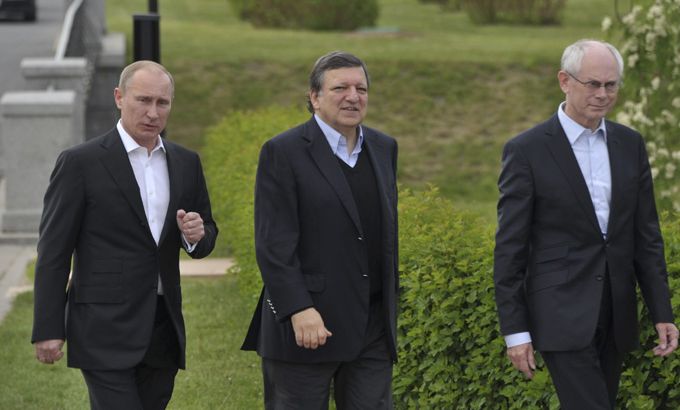China defends stance with Russia on Syria
Chinese spokesman says Beijing and Moscow are playing “positive role” in addressing crisis, as Putin arrives in China.

A Chinese official has said that Beijing and Moscow have been playing a “positive role” on Syria and reiterated the countries’ opposition to foreign intervention in the conflict, as Russian President Vladimir Putin arrived for a three-day visit.
Putin’s visit to China is aimed at bolstering crucial ties between the powerful neighbours who have aligned at the United Nations to block tougher international action against Syria despite widespread condemnation of the government’s deadly crackdown.
Liu Weimin, a Chinese foreign ministry spokesman, told a daily news briefing that both countries agreed there should be an immediate end to violence and that political dialogue should begin as soon as possible.
“Both sides oppose external intervention in Syria and oppose regime change by force,” Liu said.
“We believe ultimately the Syrian issue should be properly addressed through consultation among different parties in Syria. This is in the fundamental interests of the Syrian people. China and Russia have been playing, in their own way, a positive role on the Syrian issue.”
Both energy and foreign policy co-operation are expected to be high on the agenda for Putin’s visit, with the Russian leader also due to meet the presidents of Iran and Afghanistan as part of a regional security summit on Wednesday and Thursday.
Putin’s China trip, his first since returning to the Kremlin earlier this month, comes after failed attempts by EU leaders to sway him on Syria – a Soviet-era ally Moscow has continued to supply with arms.
Beijing and Moscow have used their veto powers at the UN Security Council to obstruct condemnation of Damascus, saying they will not back measures that could lead to foreign intervention.
Past ideological differences
Putin’s visit comes as Li Baodong, China’s UN ambassador, said his government was not trying to protect Syrian President Bashar al-Assad and would respect the will of the Syrian people on the country’s future.
Li told reporters on Monday that China was urging all parties to immediately implement international envoy Kofi Annan’s six-point peace plan, halt the killings, and launch an inclusive political process to restore peace in Syria.
Known for confronting the West repeatedly during his 2000-2008 presidency, Putin meanwhile pointedly skirted the issue of Syria during a meeting on Monday with European Union leaders in St Petersburg, noting only that “our positions do not coincide on every issue”.
Putin has been keen to play up the importance of Russia’s ties with its giant Asian neighbour, despite a long history of distrust and antagonism fuelled by territorial disputes and ideological differences between the Soviet Union and Mao Zedong’s China.
Although the two nations had periodic border conflicts, Sergei Lavrov, the Russian foreign minister, declared this weekend that Moscow had an exemplary partnership with Beijing on foreign policy.
“All in all, we consider the co-operation on foreign policy on all levels between Russia and China a successful model of co-ordination between partners,” Lavrov said in comments posted on the Russian foreign ministry’s website.
Beijing’s state-run China Daily newspaper also played up the relationship between the two countries in an editorial on Tuesday, saying it was in “good shape” and “bodes well for the future”.
Along with close co-ordination in international affairs, the two countries have sought to boost economic ties, particularly in the energy sector, setting a target of raising bilateral trade to $100bn by 2015 from $83.5bn last year.
Putin was scheduled to hold discussions with Chinese counterpart Hu Jintao later on Tuesday and then take part in a signing ceremony for a range of government and business agreements.
On Wednesday and Thursday, Putin and Hu will be among leaders attending the annual summit of the six-member Shanghai Co-operation Organisation, a grouping of Russia, China and four Central Asian states seeking to boost regional integration and curb Western influence.